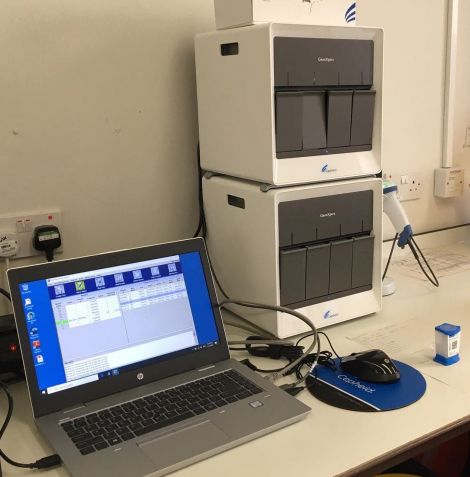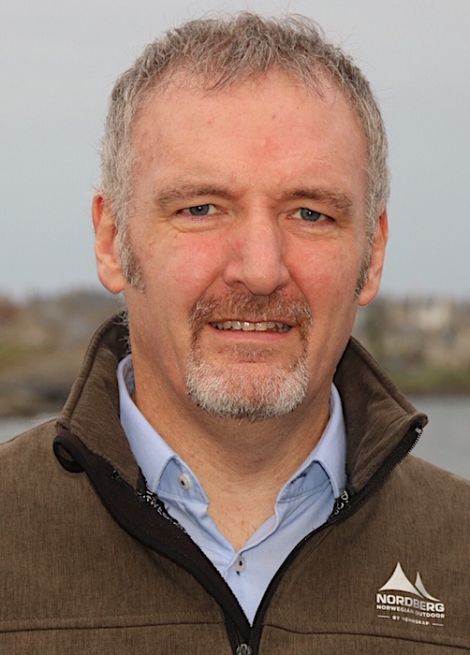Coronavirus / Health board flexible in its Covid-19 approach
NHS Shetland chairman Gary Robinson takes stock one month after lockdown was declared
THE CHAIRMAN of NHS Shetland has spoken out against the idea of a ‘Shetland pilot’ in response to Covid-19 because the local health board already has sufficient flexibility to allow it to deal with the outbreak differently.
Gary Robinson said the new coronavirus testing kit that became operational earlier this week would enable the health board to better tailor its response to the health crisis.
His comments came as voices calling for Orkney, Shetland and the Western Isles to be made special cases in combatting the virus grew louder.
A suggestion by Shetland MSP Beatrice Wishart, and others, last week resulted in a huge and varied response on the Shetland News Facebook page.
Senior health officials at NHS Shetland, meanwhile, have repeatedly said that the new testing kit would not change the board’s approach to testing for the virus, a view that was somehow contradicted by their own chairman who insisted that the board already had permission from the government to do “things differently”.
That applied to the very early stages of the outbreak, when permission was sought to ask the Up Helly Aa committees in the South Mainland and in Delting to consider postponing their festivals long before a national lockdown was ever considered – and it continues to be the case, Robinson said.
“I am not keen [on a Shetland pilot] for the simple reason because we have permission from the government to do things differently and I think we will tailor our response,” Robinson said.
That response is likely to have an element of ‘test, trace and isolate’ coming to the fore much sooner than the rest of the country, as NHS Shetland has now access to local testing kit that can give a test result within an hour.
Become a member of Shetland News
“It does give us flexibility”, Robinson said, adding that he was keen to get back to the ‘test, trace and isolate’ regime as soon as possible.
It was exactly this approach that enabled the health board to suppress a first wave of coronavirus in early March when the health protection team was able to test, trace and isolate those who had been infected by the first local cases.
But the government instructed the health board to change its approach as the country moved into the ‘delay’ phase.
“While that might have fitted national circumstances, given our small numbers it probably didn’t fit terribly well locally because we had that success in tracking down the people who we knew had been infected, and I think we got quite a good handle on it,” Robinson said.
“It was a disappointment, yes, but while I say the government stopped it, the reality was that we were starting to struggle with it because we were at that time reliant on the lab in Glasgow processing all the samples.
“It was at that point that we recognised we needed something local and we set out to get our own testing kit – so we ordered that early.”
Taking stock one month after the UK Government declared lockdown, Robinson said NHS Shetland had been as prepared as it could have been in the circumstances.
“I have to pay tribute to them for doing exactly the right thing when coronavirus arrived here in the isles,” he said.
“I think right from the outset we took a different tack, and of course the SIC closed all schools a week ahead of the rest of the UK – and I think all these things have counted in favour in terms of the relatively small number of people that we have seen coming into hospital.”
With regards to social care and the number of Covid-19 suspected deaths at Wastview, Robinson said it was not known how the virus got into the care home.
“In terms of Wastview we don’t know if it was a daycare case that brought it in or a member of staff or family – but in fairness the council probably did everything right at the time.”
He added that NHS Shetland was realistic about the time it would take to get back to some normality.
“We always recognised that this will be a long drawn out process – the only way out of the pandemic is effective treatment and ultimately getting a vaccine, and that is 12 to 18 months away if we are lucky.”
Robinson thanked the community for the sensible approach in dealing with the pandemic and added that everybody at NHS Shetland was grateful for all the “brilliant fundraising” and massive support from the community.
Become a member of Shetland News
Shetland News is asking its readers to consider paying for membership to get additional perks:
- Removal of third-party ads;
- Bookmark posts to read later;
- Exclusive curated weekly newsletter;
- Hide membership messages;
- Comments open for discussion.
If you appreciate what we do and feel strongly about impartial local journalism, then please become a member of Shetland News by either making a single payment, or setting up a monthly, quarterly or yearly subscription.









































































